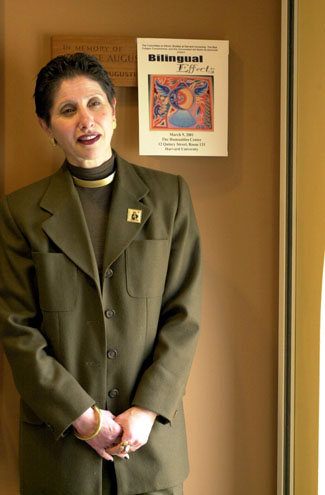The ‘bilingual effect’ says that when it comes to language, more is more

To some, a foreign language is exotic. To others, it’s strange and unwelcome.
Professor of Romance Languages and Literatures Doris Sommer is doing her best to spread the word that a multilingual culture is a rich one, full of nuances and possibilities for expression impossible in just one language. A multilingual culture, she said, is also necessary so differences can coexist in the world today.
Sommer’s efforts are already in full swing in academic circles. She has hosted two conferences on the effects of bilingualism on literature, “Bilingual Aesthetics,” in 2000, and this year’s “Bilingual Effects.” “Bilingual Effects” took place at the Barker Center in March and featured Sylvia Molloy, president of the Modern Language Association. The conference examined the impact that speaking two languages has on bilingual countries and on some great writers, such as Franz Kafka. David Suchoff of Colby College, for example, said that Kafka was influenced by the fact that he spoke Hebrew and Yiddish as well as German.
“Everyone knows [Kafka] is an innovator in German. Where does he get his inspiration? It turns out his Yiddish and Hebrew echoed in his head [while writing German],” Sommer said.
In a bilingual culture, Sommer explained, languages cross-pollinate each other, with words, grammar, and assumptions. This enriches each language and helps those living near both gain an appreciation of the others’ culture. Often, both cultures and languages coexist within a single person, creating what Sommer terms “fascinating aesthetic effects.”
Sommer calls the differences between cultures and the differences between languages “fissures” and said those fissures should be explored as an area of potential growth. Developing an appreciation for the limits of one’s own language, as well as for other cultures, tongues, and people is increasingly necessary in today’s world, she said, because trade isn’t the only thing that is being globalized.
“Were all looking at a world now where either you’re a migrant or you’re having to deal with migrants,” Sommer said. “The fact of modern life is that it’s a multilingual space.”
Sommer has termed the intersection of language and culture “Bilingual Effects,” a phrase she uses to describe the changes wrought by the different languages as they rub against each other in society. Sommer will address the topic in a talk called “Bilingual Blues” at this Friday’s conference “The Culture of Globalization” in the Science Center. Sommer, who will be on leave next year, plans to spend the time writing a book on the topic.
“I want to be reminding people this is on our collective agenda,” she said.
Sommer hopes that by naming the phenomenon and presenting it as desirable, it will become something of a cultural movement of appreciation that will head off racism and xenophobia.
“If we don’t give it a name and develop bilanguage games as a field where desire plays, we’re going to get mired in hostility and paranoia,” Sommer said. “Teaching is about developing taste, which is to say desire.”
Though most of her efforts so far have been aimed at academia, Sommer is broadening her scope. She recently gained an ally in U.S. Rep. José Serrano of New York City. Serrano has sponsored “English plus” legislation which acknowledges English as the dominant language in the United States but which also promotes the acquisition and use of other languages by Americans, the preservation of native languages and cultures, and the opposition to “English-only” legislation.
Serrano discussed his views about the benefits of bilingualism in a video that he taped for Sommer to use in her classes and to include on a Web site she is planning on bilingual arts. The site will be linked to Sommer’s Harvard page and the Web page of the Hemispheric Institute on Performance and Politics at New York University.
“The Congressman was very receptive to the idea. [He] supports what they’re doing,” said Serrano’s spokeswoman Rosalinda DeJesus.
Beyond politics, Sommer said the impact of a bilingual upbringing on a society really reaches quite broadly. When a client visits a psychologist, for example, the psychologist may assume the patient is thinking only in English, when they may be thinking and feeling through Spanish or another language.
José Antonio Mazzotti, assistant professor of Romance languages and literatures, said Sommer’s work reflects a movement in literary criticism that looks beyond the actual literature to the societies and cultures that spawned it. While that may seem obvious, Mazzotti said the traditional practice has been to examine previous literary works as influences for later work.
“Literary criticism today is very different than it was 20 years ago,” Mazzotti said. “What [Sommer is] trying to do has an ethical purpose.”
Though Sommer has described her movement as “bilingual,” that doesn’t mean she believes only two languages should be spoken in any one place. And, just because English and Spanish are the two most dominant languages in the United States, it also doesn’t mean English and Spanish should be the two global languages. Sommer is in favor of difference, not domination.
During the “Bilingual Effects” conference, participants discussed the effects of bilingualism in Paraguay, where Spanish and Guarani are the major languages, and in Spain, where Spanish, Catalan, and Basque are spoken.
Sommer’s point is that difference should be accepted and welcomed. Even a person who is bilingual, she said, would be enriched if that person occasionally ran into someone speaking a third or fourth language.
“My ideal world is not a world in which we all speak two languages,” Sommer said. “It would be a world where each of us will anticipate that someone else will speak a language that we do not master, as a constant reminder for the need to exercise respect and not to presume we can think or speak for others.”




